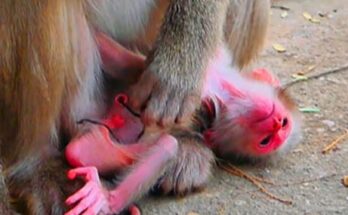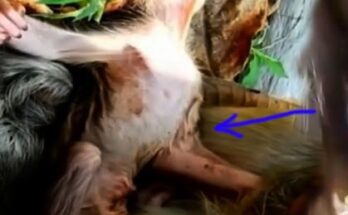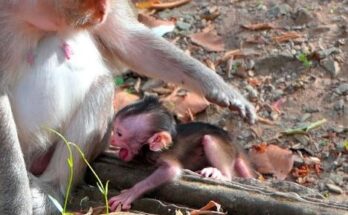Monkeys are often associated with strong social bonds, nurturing behavior, and complex family structures. However, a heartbreaking reality exists in the primate world—sometimes, mother monkeys reject their young. This behavior, while distressing to witness, is often a result of instinct, environmental pressures, and survival strategies that have evolved over millennia. Understanding why primates engage in this seemingly cruel act requires an exploration of biological, environmental, and psychological factors.
Biological and Evolutionary Factors
One of the primary reasons a monkey mother may reject her offspring is biological. Just as in other species, primates have an instinctual ability to recognize whether their young are healthy and viable. If an infant is born weak, sick, or with a genetic defect, the mother may instinctively reject it. This behavior, while harsh, is a natural form of selection that ensures the survival of the fittest. In the wild, an unhealthy baby is unlikely to survive, and a mother investing resources in a weak infant could risk her own survival or the well-being of future offspring.
Another biological reason is first-time motherhood. Young or inexperienced mothers may lack the maternal instincts needed to care for their offspring properly. In some cases, they may abandon or ignore their babies simply because they do not know how to care for them. This is more common in captive environments where social learning from experienced mothers may be limited.
Environmental and Social Pressures
Monkeys live in complex social hierarchies, and their behavior is heavily influenced by group dynamics. In many primate species, a mother’s status within the group can impact how she treats her young. If a mother is low-ranking, she may face harassment or aggression from higher-ranking females, which can result in stress, anxiety, and even rejection of her baby. In extreme cases, other monkeys may attack or even kill the infant, prompting the mother to abandon it in an attempt to protect herself.
Food scarcity is another major factor. In environments where food is limited, a mother may reject or abandon an infant because she lacks the resources to nourish it. This is a particularly common survival strategy in species that require significant maternal investment, such as orangutans or macaques. If a mother is struggling to find enough food for herself, keeping a weak or demanding infant alive may not be a viable option.
Psychological and Stress-Related Causes
Captivity and human interference can also contribute to maternal rejection. In zoos or research facilities, unnatural environments, lack of proper socialization, and stress can lead to maternal neglect. In some cases, if a mother was taken from her own mother at an early age, she may not have learned the necessary maternal behaviors and might fail to bond with her offspring.
Trauma, such as experiencing the loss of a previous infant or enduring stressful conditions, can also influence a monkey’s ability to care for her young. Just like humans, primates can suffer from psychological distress, leading to behaviors that might appear cruel but are ultimately a reflection of their survival instincts.
Conclusion
While it is deeply upsetting to see a mother reject her young, this behavior often has logical explanations rooted in evolution, biology, and social structures. It is a harsh reminder that nature prioritizes survival over sentiment. Understanding these behaviors helps us respect the complexities of primate life and underscores the importance of conservation efforts that protect these animals and their natural environments.


